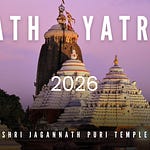In the sacred city of Varanasi, nestled near the banks of the Ganga at Tulsi Ghat, stands a unique institution — Ram-Rampati Bank. But this is no ordinary financial institution. Here, devotees do not deposit money, gold, or assets. Instead, they deposit something far more eternal — the holy name of Lord Rama.
This spiritual bank collects and records “Ram Naam Lekhan” — the written or chanted name of Shri Ram. For the faithful, this is not just a practice, but a sacred journey of discipline, devotion, and salvation.
📜 Origin and Foundation of Ram-Rampati Bank
Ram-Rampati Bank was founded in the late 20th century, inspired by saints and seers who believed that just as material banks keep track of your wealth, there should be a place that records spiritual wealth — especially the chanting and writing of "Ram", which is considered a direct path to moksha (liberation) in Sanatan Dharma.
The concept took birth around Tulsi Ghat, named after Goswami Tulsidas, the great saint who wrote the Ramcharitmanas. His devotion to Ram inspired millions, and it is fitting that a spiritual institution of such magnitude found its roots here.
“Ram naam is the ultimate wealth. If banks can record your rupees, why not a place to record your ‘Ram’? After all, only Ram goes with you beyond this life.”
🔁 How Does It Work? The Process of Depositing Ram Naam
Unlike conventional banks that require identity proofs, minimum balances, and cash, Ram-Rampati Bank only needs faith.
Here’s how it works:
Open a Spiritual Account: Any devotee can open a free account. No caste, creed, religion, or gender bar.
Receive a Lekhan Pustika (Ram Name Booklet): A notebook is issued where the devotee writes ‘राम’ (Ram) repeatedly — usually 108 names per page.
Complete the Book: Each full booklet may contain 10,000 to 1,00,000 Ram names depending on size and layout.
Deposit at the Bank: Once filled, the booklet is submitted. The entries are digitally scanned, counted, and the total number is added to the devotee’s spiritual account.
Receive an Acknowledgment: Just like bank passbooks, devotees receive updates of their spiritual ‘balance’ — i.e., total number of Ram names written.
Some devotees have written crores (tens of millions) of names over their lifetime.
🎯 Why Was Ram-Rampati Bank Established?
To structure and discipline spiritual practice.
To keep a record of devotional efforts for motivation.
To create a global Ram Bhakta community.
To encourage regular sadhana (spiritual discipline).
To preserve and revive traditional Ram Naam Lekhan.
In a world obsessed with material profit, this bank emphasizes spiritual returns.
📈 How Many Devotees Use This Bank?
Over 5 lakh+ devotees from across India and abroad are associated.
Thousands of entries are processed every month.
Entire families, including children and the elderly, participate in Ram Naam writing as a daily ritual.
Even NRIs and foreigners are part of this movement.
The bank has records of devotees who have crossed 1 crore (10 million) Ram naam entries in their lifetimes.
🧘 Spiritual Benefits of Ram Naam Writing
Writing the name of Ram is not mechanical — it is a transformative spiritual practice. According to Hindu scriptures:
“राम नाम जपते ही, भवसागर पार होता है।”
"Chanting the name of Rama allows one to cross the ocean of birth and death."
Key Benefits:
Mental Peace and clarity
Strengthens discipline and focus
Helps overcome negative thoughts
Brings the mind closer to Bhagwan Ram’s consciousness
Supports moksha (liberation) by constant remembrance of the divine
Helps in karma cleansing and developing inner humility
💡 Scientific and Psychological Benefits
Repetitive writing and chanting develops neural pathways for calmness
Induces a meditative state, similar to mindfulness practices
Reduces stress and anxiety
Enhances hand-mind-heart coordination
Builds a daily spiritual habit through repetition
🌍 Global Ram Bhakt Movement
Many temples and spiritual groups worldwide have adopted this system. Some even organize:
Ram Naam writing competitions
Group book submissions from satsangs
Digital Ram Naam Apps (where virtual writing is counted)
Ram Naam donations on festivals like Ram Navami, Hanuman Jayanti
This movement is spreading silently but powerfully — much like the name of Ram itself.
🏞️ How to Visit Ram-Rampati Bank, Varanasi
Location:
📍 Tulsi Ghat, near Assi Ghat, Varanasi, Uttar Pradesh, India
How to Reach:
By Train: Varanasi Junction (7 km) or Manduadih Station (5 km)
By Air: Lal Bahadur Shastri Airport (23 km)
By Road: Accessible via autos, cycle-rickshaws, or walking from Assi Ghat
Nearby Attractions: Tulsi Manas Mandir, Sankat Mochan Mandir, Durga Kund, BHU, and Kashi Vishwanath Temple
🔱 Importance in Sanatan Dharma
Ram Naam is considered the most powerful and pure mantra in the Kaliyuga.
Saints like Tulsidas, Kabir, Ravidas, and even Gandhiji believed in the transformative power of chanting Ram.
“In Kaliyuga, there is no dharma higher than Ram Naam.”
Ram-Rampati Bank institutionalizes this idea and provides a structured path for spiritual seekers.
💖 Deposit for the Soul, Not the Bank
In an age where banks measure your net worth, Ram-Rampati Bank measures your soul’s worth.
Here, your wealth is not counted in dollars or rupees, but in devotional repetitions of the divine name.
“The only wealth you carry beyond death is your bhakti, your sadhana, and your Ram naam.”
So next time you think of saving, maybe try saving some “Ram” — for it is the truest savings account of your soul.
📿 Jai Shri Ram 📿










